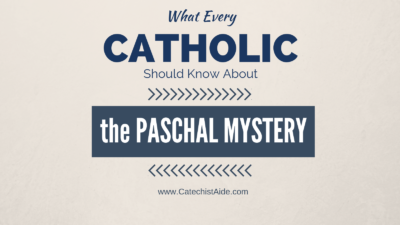We hear the term Paschal Mystery all the time, but what exactly does it mean? How do we explain the Paschal Mystery to our children and middle school students? The Lenten season is a perfect time to have this discussion. We have many mysteries in our faith. These are beliefs that we accept as truth on faith alone because they have been revealed to us by God. These mysteries are central to our faith, but not always the easiest to explain to our children and students. When we talk about the Paschal Mystery we are referring to God’s plan of salvation which was ultimately fulfilled through four events in Christ’s life. Those four events are His Passion (his suffering and crucifixion), death, Resurrection, and Ascension.
Let’s take a step back for a minute and look at the word Paschal. It comes from the Hebrew word PASACH which means to PASS OVER. This refers, of course, to the first Passover when the Lord passed over the homes of the Israelites while striking down the firstborn of Egypt. In that case, the Israelites smeared the blood of a lamb on their doorposts to signify their belief in the one true God. The sacrificing of an innocent lamb became the means of their salvation and their deliverance from captivity in Egypt. In the same way, God sent His Son to be our paschal lamb. The essence of our faith is this: that Jesus came to die for us, to free us from sin, and so that we might have a new and eternal life.
This was God’s plan from the start
We can go back to the Garden of Eden just after the original sin of Adam and Eve, to the protoevangelium. This is where God gives us the first glimpse of His salvific plan, saying to the serpent, “I will put enmity between you and the woman, and between your offspring and hers; They will strike at your head, while you strike at their heel.” (Genesis 3: 15) And, we can look back at each of the covenants of the Old Testament, to see where God continued to reach out to humanity, again and again, in an effort to restore us into loving relationship with Him.
At every Mass, which itself is a celebration of the Paschal Mystery, we remember and proclaim “the mystery of faith,” when we respond:
Save us, Savior of the world,
For by your Cross and Resurrection
You have set us free.
Living the Paschal Mystery
When we speak these words at Mass, we affirm our belief in the Paschal Mystery and more. We don’t say “Save me, Savior of the world …” but save us. The Paschal Mystery tells us that we are not to be concerned only with our own personal salvation, but the salvation of all.
What is my role, then, in God’s saving plan? How can I join in the Paschal Mystery? We need only look at the instruction that Jesus gave to his apostles just before he ascended into heaven. He told them, “Go therefore, and make disciples of all nations, baptizing them in the name of the Father, and of the Son, and of the holy Spirit, teaching them to observe all that I have commanded you.” (Matthew 28: 19-20) What does this mean for us? When we answer the call to holiness, when we live our lives according to the Beatitudes, when we receive the Sacraments, we are living as Jesus commanded. In a spiritual sense, whenever we personally die to sin, to our personal desires and to ourselves, and rise to a life centered on Christ, we are living the Paschal Mystery.
Try out this activity designed to help middle school students better understand the events of Christ’s Paschal Sacrifice. It is free to download just click here.
© 2018 Catechist’s Aide
